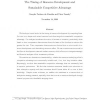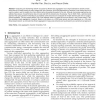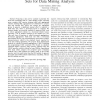492 search results - page 27 / 99 » Data Integration: Where Does the Time Go |
SSDBM
2009
IEEE
14 years 2 months ago
2009
IEEE
Scientific experiments produce large volumes of data represented as complex objects that describe independent events such as particle collisions. Scientific analyses can be express...
MANSCI
2007
13 years 7 months ago
2007
We develop a formal model of the timing of resource development by competing …rms. Our aim is to deepen and extend resource-level theorizing about sustainable competitive advant...
TMC
2008
13 years 7 months ago
2008
Computing and maintaining network structures for efficient data aggregation incurs high overhead for dynamic events where the set of nodes sensing an event changes with time. Moreo...
TKDE
2012
11 years 9 months ago
2012
—Preparing a data set for analysis is generally the most time consuming task in a data mining project, requiring many complex SQL queries, joining tables and aggregating columns....
IASTEDSE
2004
13 years 8 months ago
2004
The integration of distributed, data dependent components requires a data synchronisation model. We consider a class of systems where data-dependent components produce data in dis...



